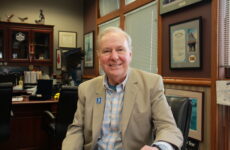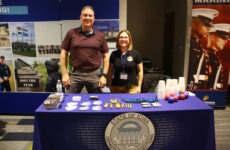Can you read this article in less than a minute? If not then you should add speed reading to your schedule for next semester.
Speed reading, taught by Margaret Ranch and Susan Wickham, can earn you three college-transfer elective credits.
It can increase your reading rate, deepen your comprehension level, sharpen your textbook study skills, expand your vocabulary, and cause you to become a more flexible reader.
Margaret Ranch, Academic Achievement Center instructor, teaches one of the speed reading classes.
“Speed reading helps students develop critical reading skills,” Ranch said.
Ranch thinks that every student at DMACC should take a reading course.
“The class is focused on how fast you can get the info and how fast you can understand it,” Ranch said.
They have a computer in class that shows how fast you can read. They also have timed readings, vocab work and write a book review about the novel of their choice.
Ranch explains that it is not the same as a composition class.
“You’re going to do better in a comp class if you take a reading class first,” Ranch said.
Alan J. Hutchison, Professor of English and district chair of humanities, teaches the American in the Movies class.
“America in the Movies is a different kind of film class,” Hutchison said.
The Hollywood film community is the dominant force for cinema in the world and it is highly dynamic and constantly evolving.
“However, it can be difficult to study the films that people know best and it helps to have some kind of distance from the narrative conventions we take for granted,” said Hutchison.
In this class you will study films that are not ‘Hollywood’ so that you can understand and make comparisons. “By comparing and contrasting similar films from different film communities, we notice much more about them than if we looked at only classical Hollywood narrative,” Hutchison said.
Andrew Neuendorf, English instructor, teaches the Science Fiction Literature class.
“I rely on the bread and butter of literature courses: reading, discussion, and writing,” Neuendorf said.
In the Spring 2013 semester he hopes to show a couple of science fiction films, in addition to the books. He has also been trying to integrate creative projects into more literature courses, as a side project.
“Science fiction doesn’t predict the future, but it helps us reflect on the drastic changes of our times. When you walk down a busy city street and see everyone staring at their miniature computers, connected to people all around the world, you can’t help but think that technology is changing everything,” Neuendorf said.
Science Fiction, in part, forces you to ask whether or not these changes are good, and where they might be taking us.
One topic the class discussed this fall was artificial intelligence and the potential risks and benefits it presents. “Ultimately, the best reason to take this course is for the opportunity to read and discuss great books without feeling as if you’re taking time away from homework. Also, though students don’t like to admit it, I tell funny jokes and do spot-on impressions,” Neuendorf said.





Comments